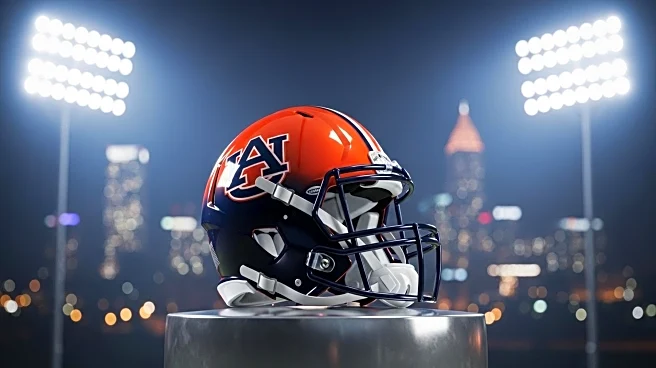What's Happening?
Auburn University has announced that its 2026 football season opener against Baylor will be relocated to Atlanta's Mercedes-Benz Stadium. This decision is part of a strategic move to enhance Name, Image, and Likeness (NIL) opportunities for Auburn student-athletes. The game, originally scheduled as a home-and-home series, will now be part of the Aflac Kickoff Game, facilitated by Peach Bowl, Inc. Through this multi-million-dollar partnership, Auburn players will gain significant exposure and new avenues for NIL compensation, tied directly to ticket sales and promotional events surrounding the game. Auburn's athletic director, John Cohen, emphasized the financial and brand benefits for student-athletes playing on a national stage against a Power Four opponent.
Why It's Important?
The relocation of the Auburn vs. Baylor game to a neutral site in Atlanta is significant for several reasons. It highlights the growing importance of NIL opportunities in college sports, providing Auburn athletes with potential earnings of around $5 million. This move reflects a broader trend in college athletics where institutions are leveraging high-profile games to enhance student-athlete visibility and financial prospects. The decision also underscores the competitive landscape of college football, where schools are increasingly seeking innovative ways to support their athletes financially and enhance their programs' appeal. Auburn's approach may set a precedent for other universities looking to maximize NIL benefits for their athletes.
What's Next?
As Auburn prepares for the 2026 season opener, stakeholders will likely focus on maximizing the promotional and financial aspects of the event. Auburn Athletics will work closely with Peach Bowl, Inc. and third-party entities to ensure the successful execution of marketing strategies that benefit student-athletes. Fans and alumni may express mixed reactions, with some disappointed by the loss of a home game atmosphere at Jordan-Hare Stadium. However, the financial incentives and national exposure could outweigh these concerns. The broader college sports community will watch closely to see if other institutions adopt similar strategies to enhance NIL opportunities.











